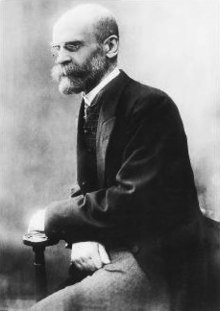Dürkheim
| Émile Durkheim | |
|---|---|

French sociologist
|
|
| Born | David Émile Durkheim April 15, 1858 Épinal, Lorraine, France |
| Died | November 15, 1917 (aged 59) Paris, Île-de-France, France |
| Nationality | French |
| Fields | Philosophy, sociology, education, anthropology, religious studies |
| Institutions | University of Paris, University of Bordeaux |
| Alma mater | École Normale Supérieure |
| Known for | Institutionalizing sociology, introducing the sacred–profane dichotomy |
| Influences | Immanuel Kant, René Descartes, Plato, Herbert Spencer, Aristotle, Montesquieu, Jean-Jacques Rousseau, Auguste Comte. William James, John Dewey, Fustel de Coulanges, John Stuart Mill |
| Influenced | Marcel Mauss, Claude Lévi-Strauss, Talcott Parsons, Maurice Halbwachs, Lucien Lévy-Bruhl, Bronisław Malinowski, Fernand Braudel, Pierre Bourdieu, Charles Taylor, Henri Bergson, Emmanuel Levinas, Steven Lukes, Alfred Radcliffe-Brown, E. E. Evans-Pritchard, Mary Douglas, Paul Fauconnet, Robert Bellah, Ziya Gökalp, David Bloor, Randall Collins, Jonathan Haidt |
David Émile Durkheim (French: [emil dyʁkɛm] or [dyʁkajm]; April 15, 1858 – November 15, 1917) was a French sociologist, social psychologist and philosopher. He formally established the academic discipline and—with Karl Marx and Max Weber—is commonly cited as the principal architect of modern social science and father of sociology.
Much of Durkheim's work was concerned with how societies could maintain their integrity and coherence in modernity; an era in which traditional social and religious ties are no longer assumed, and in which new social institutions have come into being. His first major sociological work was The Division of Labour in Society (1893). In 1895, he published The Rules of Sociological Method and set up the first European department of sociology, becoming France's first professor of sociology. In 1898, he established the journal L'Année Sociologique. Durkheim's seminal monograph, Suicide (1897), a study of suicide rates in Catholic and Protestant populations, pioneered modern social research and served to distinguish social science from psychology and political philosophy. The Elementary Forms of the Religious Life (1912) presented a theory of religion, comparing the social and cultural lives of aboriginal and modern societies.
...
Wikipedia
